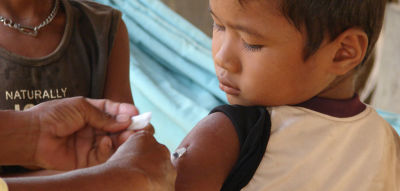Featured Media Resource: VIDEO: Jimmy Carter’s Last Wish (Vocativ)
Jimmy Carter describes his dream for the last guinea worm to die before he does.
Do Now U
Who Should Be Responsible for Funding Global Health Initiatives? #DoNowUHealth
How to Do Now
To respond to the Do Now U, you can comment below or post your response on Twitter. Just be sure to include #DoNowUHealth and @KQEDedspace in your posts.
Learn More about the Funding of Global Health Initiatives
Since 1986, Jimmy Carter has worked to eradicate the guinea worm. From an initial 3.5 million cases to only 126 in 2014, the Carter Center has nearly succeeded in making guinea worm the second disease in human history, after smallpox, to be eradicated. However, Carter has been the only one pushing for the eradication of this disease. Organizations such as UNICEF and the World Health Organization (WHO) have aided in approving measures, but have not monetarily contributed to the program. For decades, philanthropic health intervention has supported governments in areas struggling to cope with diseased populations. Global health initiatives have largely become reliant on a handful of well-wishers like Jimmy Carter because of how difficult it is for governments and international organizations alike to raise funds for humanitarian ventures. The weighing of economic burdens against health burdens has raised an important question: who should be fiscally responsible for maintaining the health of humanity?
With campaigns such as the Carter Center’s guinea worm eradication plan and the Bill & Melinda Gates Foundation’s tuberculosis incidence reduction program, efforts made by philanthropic organizations are playing a major role in solving the world’s health issues. By focusing on and devoting large sums of money to specific projects, these organizations have been effective in many respects. However, those who are responsible for deciding which health programs should receive funding and which ones have to wait are faced with overwhelming ethical questions, and are often themselves unaffected by the health issues at hand. Moreover, philanthropic organizations operate out of their own good will. Because of this, it might not be feasible to rely on them to continue paying for the world’s health without an effective and reliable system in place.
 [/media-credit]
[/media-credit]International humanitarian organizations, most notably WHO, work side-by-side with philanthropic organizations. WHO supports countries to improve health technologies, strengthen health information systems and assure that all people have access to health services at an affordable price. The World Bank, a similar United Nations institution, provides policy advice to help countries expand access to affordable health care, protect people from poverty caused by illness and promote investments that support humanitarian advancement. Although these entities provide coordinating authority in health and set global agendas for achieving universal wellness, they are severely underfunded and often rely on private philanthropic organizations to initiate global health projects. This situation raises the question of whether or not international humanitarian organizations like WHO should receive more funding from Western nations. Even so, there are many concerns surrounding a single international organization having the power to set and police the global health agenda for the entire world. There are also ethical concerns regarding the potential for Western countries with greater monetary influence to manipulate an international organization into a surrogate for their own health ventures.